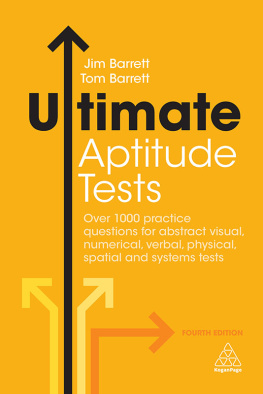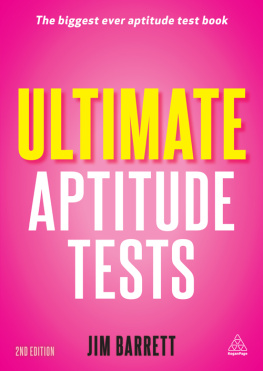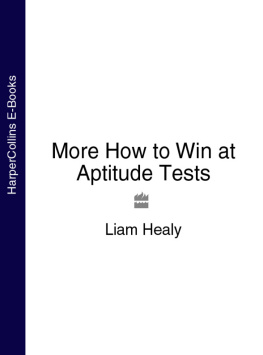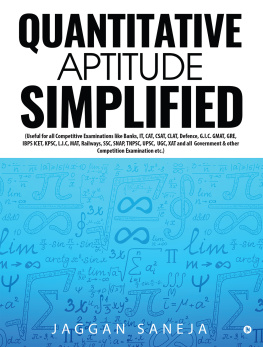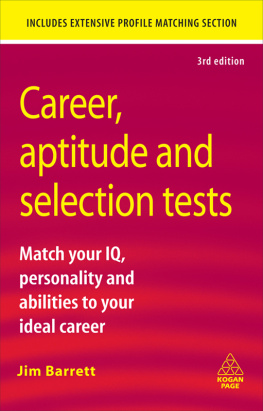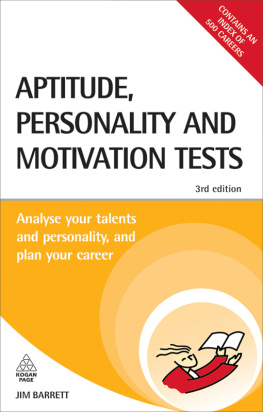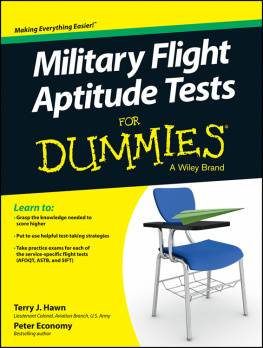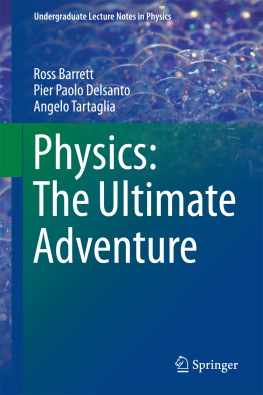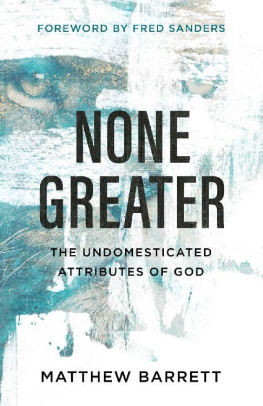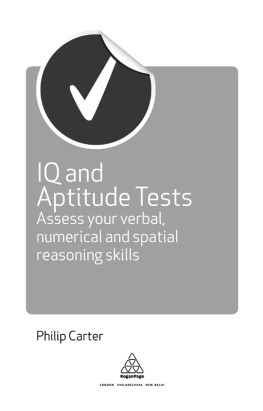Jim Barrett - Ultimate Aptitude Tests
Here you can read online Jim Barrett - Ultimate Aptitude Tests full text of the book (entire story) in english for free. Download pdf and epub, get meaning, cover and reviews about this ebook. year: 2018, publisher: Kogan Page, genre: Children. Description of the work, (preface) as well as reviews are available. Best literature library LitArk.com created for fans of good reading and offers a wide selection of genres:
Romance novel
Science fiction
Adventure
Detective
Science
History
Home and family
Prose
Art
Politics
Computer
Non-fiction
Religion
Business
Children
Humor
Choose a favorite category and find really read worthwhile books. Enjoy immersion in the world of imagination, feel the emotions of the characters or learn something new for yourself, make an fascinating discovery.
- Book:Ultimate Aptitude Tests
- Author:
- Publisher:Kogan Page
- Genre:
- Year:2018
- Rating:4 / 5
- Favourites:Add to favourites
- Your mark:
- 80
- 1
- 2
- 3
- 4
- 5
Ultimate Aptitude Tests: summary, description and annotation
We offer to read an annotation, description, summary or preface (depends on what the author of the book "Ultimate Aptitude Tests" wrote himself). If you haven't found the necessary information about the book — write in the comments, we will try to find it.
Jim Barrett: author's other books
Who wrote Ultimate Aptitude Tests? Find out the surname, the name of the author of the book and a list of all author's works by series.
Ultimate Aptitude Tests — read online for free the complete book (whole text) full work
Below is the text of the book, divided by pages. System saving the place of the last page read, allows you to conveniently read the book "Ultimate Aptitude Tests" online for free, without having to search again every time where you left off. Put a bookmark, and you can go to the page where you finished reading at any time.
Font size:
Interval:
Bookmark:

 Publishers note Every possible effort has been made to ensure that the information contained in this book is accurate at the time of going to press, and the publishers and authors cannot accept responsibility for any errors or omissions, however caused. No responsibility for loss or damage occasioned to any person acting, or refraining from action, as a result of the material in this publication can be accepted by the editor, the publisher or the authors. Some of the tests included in this book have previously been included in Aptitude, Personality and Motivation Tests (2004), How to Pass Advanced Aptitude Tests (2008) and The Aptitude Workbook (2008) published by Kogan Page. First published in Great Britain and the United States in 2008 by Kogan Page Limited Second edition 2012 Third edition 2015 Fourth edition 2018 Apart from any fair dealing for the purposes of research or private study, or criticism or review, as permitted under the Copyright, Designs and Patents Act 1988, this publication may only be reproduced, stored or transmitted, in any form or by any means, with the prior permission in writing of the publishers, or in the case of reprographic reproduction in accordance with the terms and licences issued by the CLA. Enquiries concerning reproduction outside these terms should be sent to the publishers at the undermentioned addresses: 2nd Floor, 45 Gee Street London EC1V 3RS United Kingdom c/o Martin P Hill Consulting 122 W 27th Street New York, NY 10001 USA 4737/23 Ansari Road Daryaganj New Delhi 110002 India www.koganpage.com Jim Barrett, 2008, 2012 Jim Barrett and Tom Barrett, 2015, 2018 The rights of Jim Barrett and Tom Barrett to be identified as the authors of this work have been asserted by them in accordance with the Copyright, Designs and Patents Act 1988. ISBN 978 0 7494 8208 4 EISBN 978 0 7494 8209 1 Typeset by Integra Software Services, Pondicherry Print production managed by Jellyfish Printed and bound by CPI Group (UK) Ltd, Croydon, CR0 4YY
Publishers note Every possible effort has been made to ensure that the information contained in this book is accurate at the time of going to press, and the publishers and authors cannot accept responsibility for any errors or omissions, however caused. No responsibility for loss or damage occasioned to any person acting, or refraining from action, as a result of the material in this publication can be accepted by the editor, the publisher or the authors. Some of the tests included in this book have previously been included in Aptitude, Personality and Motivation Tests (2004), How to Pass Advanced Aptitude Tests (2008) and The Aptitude Workbook (2008) published by Kogan Page. First published in Great Britain and the United States in 2008 by Kogan Page Limited Second edition 2012 Third edition 2015 Fourth edition 2018 Apart from any fair dealing for the purposes of research or private study, or criticism or review, as permitted under the Copyright, Designs and Patents Act 1988, this publication may only be reproduced, stored or transmitted, in any form or by any means, with the prior permission in writing of the publishers, or in the case of reprographic reproduction in accordance with the terms and licences issued by the CLA. Enquiries concerning reproduction outside these terms should be sent to the publishers at the undermentioned addresses: 2nd Floor, 45 Gee Street London EC1V 3RS United Kingdom c/o Martin P Hill Consulting 122 W 27th Street New York, NY 10001 USA 4737/23 Ansari Road Daryaganj New Delhi 110002 India www.koganpage.com Jim Barrett, 2008, 2012 Jim Barrett and Tom Barrett, 2015, 2018 The rights of Jim Barrett and Tom Barrett to be identified as the authors of this work have been asserted by them in accordance with the Copyright, Designs and Patents Act 1988. ISBN 978 0 7494 8208 4 EISBN 978 0 7494 8209 1 Typeset by Integra Software Services, Pondicherry Print production managed by Jellyfish Printed and bound by CPI Group (UK) Ltd, Croydon, CR0 4YY They are suited to people at secondary school, college and in employment.
Why internally, when you might suppose that a persons abilities and characteristics are already well known? Here are some of the advantages:
- to create awareness of further potential for development in the persons present job;
- as a means of assessing suitability for alternative functional opportunities within the same organization;
- in competition with external applicants, to deliberately test the market, that is, to ensure that the quality of internal staff is keeping pace with what is happening in other, possibly rival, organizations;
- as a way of validating training programmes;
- for purposes of career guidance and counselling.
- to obtain the most competent students or staff and to develop that competence in order to make fullest use of each persons contribution;
- to reduce the risk of people leaving, since it makes sense to develop staff, where possible, if they have talents that can be extended;
- to be proactive in discovering potential in staff who may not be aware of it themselves;
- to develop relevant training programmes, either because the tests check on the effectiveness of training or because they help to make sure that training is directed at those most likely to benefit from it;
- to obtain increased staff satisfaction as the result of using tests, since they are not used to judge performance in the present job, but to reveal possible opportunities.
In the case of aptitude tests, the type of ruler used is a scale to measure validity. The scale of validity is said to be zero if a forecast is correct only 50 per cent of the time. This is equivalent to tossing a coin and obtaining heads or tails. If you could predict accurately every time the coin was tossed whether it would land heads or tails, then you would be predicting with perfect accuracy. In this case the validity would be 100 per cent. Any test or forecast that is better than chance may be useful.
That is why we ask the advice of people we presume to be wise; as they have done it before we hope they will increase our chances of making a good choice. The trouble with using a wise person is, of course, that what they say is not scientific, whatever skill they have being limited to their own experience. It is very difficult indeed to obtain a perfect prediction, though in some sciences and industries we are shocked when we learn that predictions are imperfect. For example, a prediction that an aircraft will not crash is very close to 100 per cent. Aircraft safety needs to be an almost-perfect prediction as we would probably not ride in an aircraft if we thought that it had any chance of crashing. In fact, predictive validity in this area is so high that most of us can put it out of our minds.
Yet, unfortunately, crashes occur, reminding us that we do have to live with less-than perfect prediction in this world. Predicting human performance is extremely complicated, much more difficult than predicting what will happen to machines. This is why predictions based upon tests, even those that are well researched, commonly fall well short of a perfect 100 per cent. This may be for two reasons: 1) there may be circumstances related to the test itself, including its administration or interpretation that undermine its predictive value; 2) there may be circumstances around the person, or subject, who has taken the test that alter the chance of the test being predictive, such as altered social or emotional circumstances. Among selection devices, graphology, astrology and similar methods are no better than chance. Although individuals who claim to have special insight or powers of divination have been employed by organizations to help make selection of staff, their success has probably depended more on their intuition as an interviewer than any valid method in their prognostications.
Font size:
Interval:
Bookmark:
Similar books «Ultimate Aptitude Tests»
Look at similar books to Ultimate Aptitude Tests. We have selected literature similar in name and meaning in the hope of providing readers with more options to find new, interesting, not yet read works.
Discussion, reviews of the book Ultimate Aptitude Tests and just readers' own opinions. Leave your comments, write what you think about the work, its meaning or the main characters. Specify what exactly you liked and what you didn't like, and why you think so.

